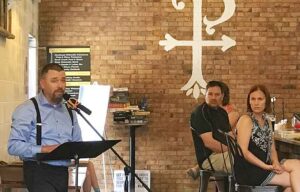Who is Dwaine Spieker? One of University of Nebraska-Kearney’s most accomplished graduates! One of Nebraska’s most award-winning poets! A teacher with a heart for students at Wayne Public schools, Nebraska! Here is just a short summary of Dwaine’s achievements:
After growing up on a farm outside Elgin, Nebraska, he attended the University of Nebraska at Kearney, graduating in 1997, and received his MA from the University of Nebraska-Lincoln in 2001. Since then he has been the recipient of National Endowment for the Humanities grants in the Summer Seminars for Schoolteachers Program, not once but twice (2002 and 2007). The Wayne Area Economic Development Council named him its 2009 Educator of the Year.
Spieker’s poetry has appeared in Plainsong, The Platte Valley Review, The Nebraska Poets Calendar, The Plain Song Review, The Omaha World-Herald, Nebraska Life, Midwest Quarterly, Aethlon, Nimrod and in one of the nation’s most prestigious publications, Prairie Schooner.
Dwaine’s first book, Garden of Stars – All Along Press, St. Louis, Missouri. 2010 Nebraska Book Award for Poetry.
His second and third collections, The Way Magellan Must Have Felt and Learning to Drive Nails, were published by Rogue Faculty Press in 2014 and 2018 respectively. He has also been also a finalist for the 2014 Pablo Neruda Prize from Nimrod and a semi-finalist in 2015. In 2017, he edited, Homing: The Collected Poems of Don Welch, 1975-2015 which also received the Nebraska Book Award.
Dwaine’s Poems
Elegy in August—Don Welch, 1932-2016
August is always
part of the past.
With cornfields
at black-green
and cicadas at song,
it is a fullness
we cannot hold
except in memory,
a present abundance
we cannot abide
until it retires
into personal history.
We are part spring,
part harvest,
and mostly winter.
Summer eludes us,
year after year.
From Learning to Drive Nails 2018
Pitchfork
It taught me early how much weight
a forkful was, the right amount
of rye straw or prairie hay
to pitch forward or lift over
without laziness or overstrain.
Footing. Poise. Balance. Shape.
The right amount, held eye-level,
hung to my waist, strangely buoyant.
My right hand ran the handle;
the clumsier left served as fulcrum
and bore the load. It taught me early
how good work felt, how cleaning up
and clearing out approached perfection,
how fork by fork I could heft tons.
Review
“In Learning to Drive Nails, Dwaine Spieker offers some wonderful images celebrating the various states of life…. Spieker recalls the process learning “how good work felt, how cleaning up/and clearing out approached perfection,/how fork by fork I could heft tons.” ~ Neil Harrison, author of Back in the Animal Kingdom.
From Plainsongs. Award Poem, Spring 2014
Electric Fence
Tonight the constellations are all cattle
grazing the sandhills of outer space,
and keeping them herded together afield
is an electric fence, a single wire
through which ticks a current of meaning.
Of course it’s a trick; of course they could trample
the fence in an instant, the shock so small
compared to their strength, size, and girth.
But the stars stay away, and the fence stands
thin but distinct. Somehow it works.
From The Way Magellan Must Have Felt
Headstones
The headstones here
resemble robins,
slow birds of stone,
wings folded in.
They perch at the tips
of the limbs of time,
their spring too large
for anyone to sense,
Their songs too high
for living pitch.
Review
In The Way Magellan Must Have Felt “Dwaine Spieker focuses on the music of leaves and insects, of the land as sea, and finds extraordinary loss, love and everyday life.” ~ Twyla Hansen, Nebraska State Poet (2013-2018).
From Nimrod, Pablo Neruda Award Finalist, Fall/Winter 2014
Town Cemetery
Today its central lane
seems a long floating dock,
old cedars and pines
splashing up at the sides,
headstones bobbing like buoys.
So it takes a good moment
to regain your sea-legs,
step out, and begin to walk.
It’s so hard to find balance
when your firmest footing
actually floats, floats atop
the waters of life and time,
but it helps to walk here often,
maintaining equilibrium,
your eyes on the distance,
on seagulls and ships.



